-
Place of Birth
Columbus, Indiana, US
-
Place of Death
Indianapolis, Indiana, US
-
Burial Place
Garland Brook Cemetery, Columbus, Indiana, US
Born: 6 March 1876, Columbus, Bartholomew County, Indiana
Died: 8 November 1921, Indianapolis, Marion County, Indiana
Buried: Garland Brook Cemetery
Documented History
Jacob William Beyl Jr. was born on March 6, 1876, in Columbus, Indiana, as confirmed by both his death certificate and World War I Draft Registration. He was the son of Jacob Beyl Sr., a French-born laborer who suffered physical disability, and Margaret (Kern), whose German ancestry would shape the family’s Midwestern immigrant narrative.
🏠 Early Life: 1880 Census
Jacob Jr. appears in the 1880 census at just four years old as “William,” living at 228 Jackson Street in Columbus with his parents and younger sister Mary. His father, Jacob Sr., worked as a railroad laborer despite being listed as “maimed or crippled.” His mother, listed then as Elizabeth, was a homemaker.

🪚 Working Years: 1900–1917
By 1900, Jacob Jr. lived with his parents and several younger siblings, including John, Lillie, and Thomas. He and his father worked as carpenters, though both faced extended periods of unemployment that year. The household also included an infant granddaughter, Helen Bond.

Throughout the early 1900s, Jacob Jr. appears in Columbus city directories, consistently living with his parents at 542 Jackson Street.

In 1902, per U.S. City Directories, 1822-1995, Jacob Jr. lived with his parents at 542 Jackson, Columbus, Indiana. Jacob Sr. is listed as a constable.

In 1910, the census placed him in a liquor factory, alongside his brother John. Their mother, Margaret, had begun working outside the home, possibly in poultry and dairy.

In the 1917 directory, Jacob was employed as an assembler at the Emerson Brantingham Company—the same company where his brother John worked. Their mother is listed as a widow at that time.
🪖 Military Registration
On September 12, 1918, Jacob Jr. registered for the draft during World War I. He was 42 years old and employed as a woodworker with the Brantingham Company on East 5th Street in Columbus. He described himself as short, of medium build, with grey eyes and mixed-colored hair. He listed his mother, Margaret, as his closest relative—she was then living in Indianapolis.
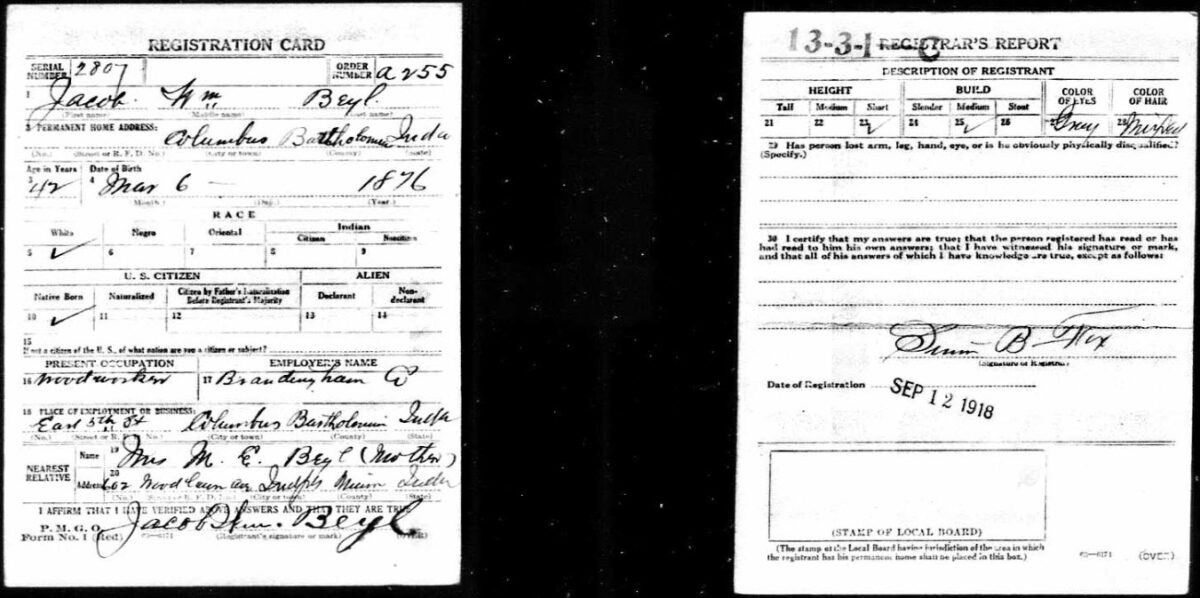
Life in Indianapolis: 1919–1921
By 1919, Jacob Jr. had moved to Indianapolis and lived with his younger brother Grover T. at 1417 E. Tabor Street.

The 1920 census confirms this arrangement. Jacob worked as a laborer at a match factory, while Grover, the head of household, worked in a machine shop. Grover’s wife, Katherine, their toddler daughter, Elizabeth, and their niece, Helen Smith, also lived in the home.

By 1921, Jacob and Grover had moved again to 1424 Cruft Street, where both brothers were working as laborers.

⚰️ A Difficult End
On November 8, 1921, Jacob William Beyl Jr. died by suicide at the age of 45. According to his death certificate and a report in The Indianapolis Star, he first shot himself in the chest. That bullet passed through his body and struck his brother-in-law in the arm—who had entered the scene unexpectedly. Moments later, Jacob turned the gun on himself again, firing the fatal shot to the temple. His sister and brother-in-law witnessed the tragedy from a nearby window.
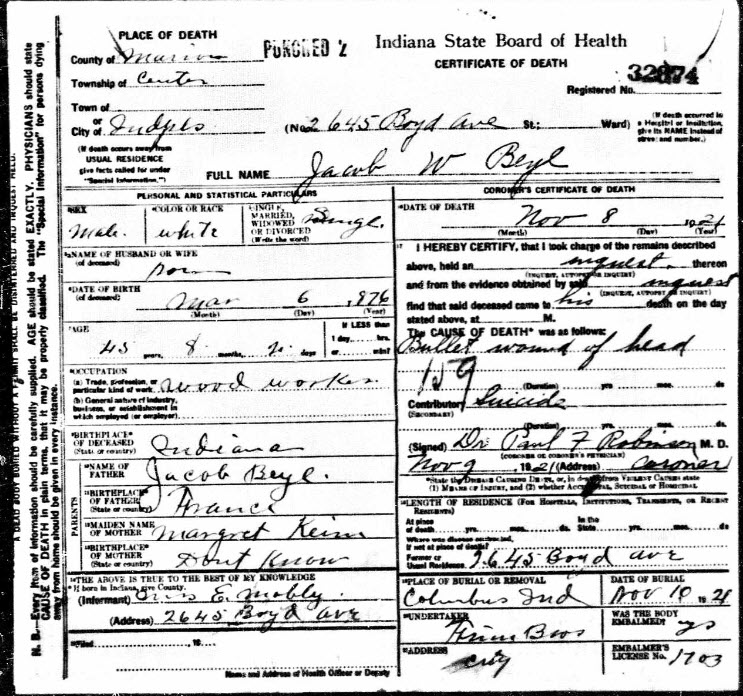
Jacob reportedly left behind five suicide notes, expressing profound loneliness and the belief that no one liked him. He was unemployed at the time and had never married.
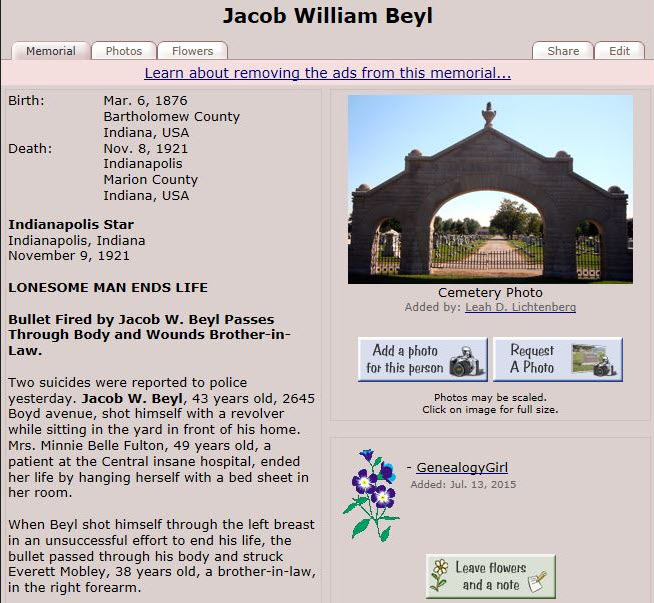
His remains were laid to rest at Garland Brook Cemetery on November 10, 1921. His occupation was recorded as woodworker. His father was listed as Jacob Beyl, born in France, and his mother was Margaret Kern.
🕯 Reflections
Jacob Jr.’s story is among the most haunting in the Beyl family line. His life, as glimpsed through census entries, draft records, and death notices, reflects a man who lived mainly in the company of family—yet still struggled with the profound pain of isolation. In many ways, this is the quiet tragedy of a working man whose labor went unnoticed and whose sorrow remained unspoken.
✍️ Want to Share?
If you have memories, family stories, or reflections about Jacob William Beyl Jr., I invite you to share them on his Introduction Page. Comments are open there, and your voice could help illuminate his story.
As always, I’ll update this page as more details emerge.
Until next time,
~Kris
🧡 If You’re Struggling
If you or someone you know is struggling with thoughts of self-harm, please know you are not alone. Help is available.
In the U.S., you can call or text 988 to reach the Suicide & Crisis Lifeline, 24/7 and free of charge.
For more resources, visit: 988lifeline.org
There is hope. There is help. And there are people who care.
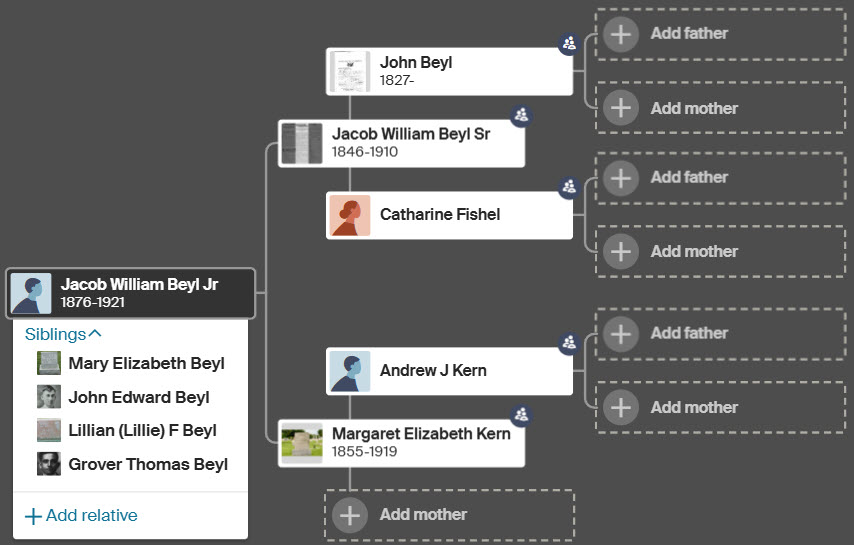
🕵️ Revisited by Bones
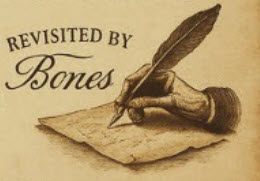
The quiet ones in the margins of the census sheets often leave the loudest echo.
Jacob William Beyl Jr.—unmarried, woodworker, always sharing a roof with family—might’ve seemed like just another line item in a crowded household. But his story lingers. You can feel it. A man living in the shadows of others, sometimes employed, often not. The kind of man who disappears in directories long before he’s truly gone.
He was always there—living with his mother, his brothers, his sister. Never quite out on his own, but never really surrounded, either. And in the end, when he believed no one liked him, he wrote it down. Five times. We often read these historical records like cold facts, but they’re pulsing with emotion if you tilt your head just right.
Jacob Jr. died feeling unseen. But he’s not unseen now. Not here. Not by us.
Not by the family still whispering through his name a century later.
And yes—his death was violent, tragic, and witnessed. But even that awful moment tells a larger story: about a family trying to hold itself together through change, war, loss, and the slow erosion of the industrial grind. His pain may have gone unspoken then, but it won’t be forgotten now.
This is precisely why we revisit these records, isn’t it?
To pull someone like Jacob Jr. out of the statistical silence and remind the world that he mattered.
And he did.
—Bones
🕯️ Jacob William Beyl Jr.
(1876 - 1921)

